The good news is that tap water in most of South Africa’s big cities is still rated as “safe” to drink (albeit declining) – but the same cannot be said for municipal water supplies in large swathes of the country.
According to the latest Blue Drop report published on Tuesday, 5 December, “it was not microbiologically safe to drink the water in almost half (46%) of our drinking water systems at times during 2022 when the Blue Drop audit was done” – increasing the risk of life-threatening water-borne diseases such as cholera and chronic diarrhoea.
On a national basis, close to half (47%) of municipal tap water is now classified as non-revenue water (NRW) due to leaking pipes, wonky or non-existent water meters, illegal connections and poor billing and revenue collection – way above the international average of 30% for non-revenue water.
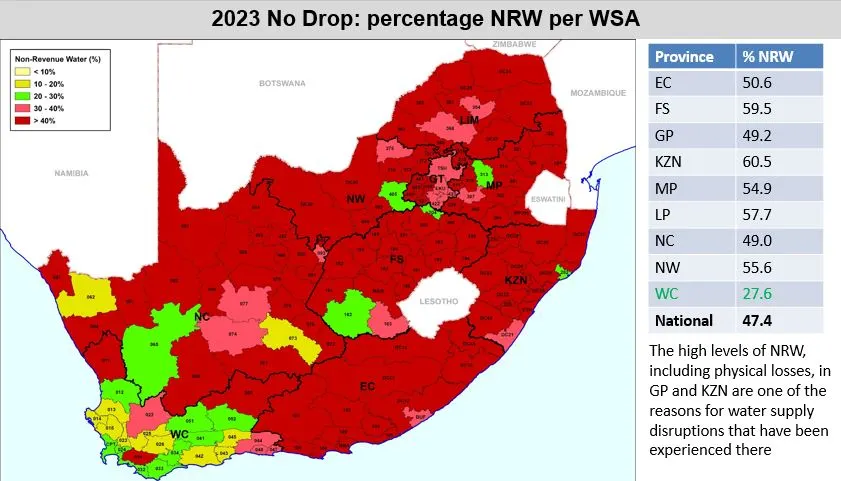 (Image: Supplied)
(Image: Supplied)
In some cities, the waste or non-payment rate is much higher – with no funds recovered for 58% of the water currently supplied to eThekwini.
At a provincial level, KwaZulu-Natal has the highest rate of non-revenue water waste (60.5%), followed by the Free State (59.5%), Limpopo (nearly 58%) – while the Western Cape had the lowest rate (about 27%).
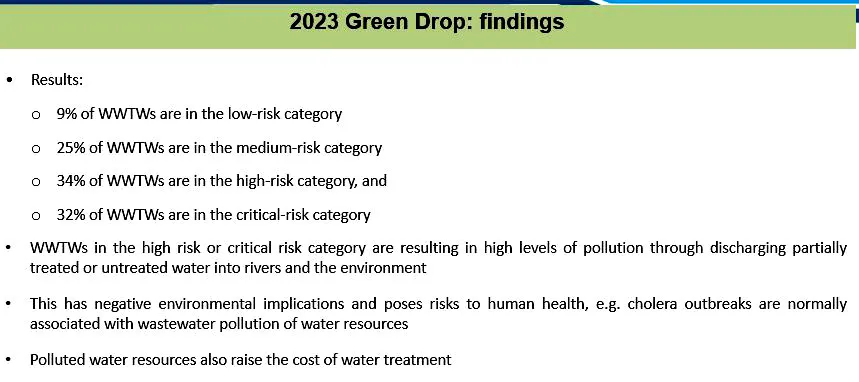 (Image: Supplied)
(Image: Supplied)
Nearly two-thirds (64%) of the country’s sewage and wastewater treatment works are also at “high or critical risk” of discharging partially treated or untreated water into rivers and the environment.
The three reports (Blue Drop, No Drop and the Green Drop progress report) were published on Tuesday by Water and Sanitation Minister Senzo Mchunu, who acknowledged the need for “fundamental reform” to arrest the decline in municipal water and sanitation services.
To his credit, Mchunu resuscitated the three water auditing schemes last year after they were dumped by former water minister Nomvula Mokonyane in 2014 to avoid political embarrassment.
Significantly, the latest Blue Drop report includes a prominent quote from the American writer and philosopher, Elbert Hubbard, who proclaimed: “The final proof of greatness lies in being able to endure criticism without resentment.”
Lamenting the poor results, the director-general of the Department of Water and Sanitation (DWS), Dr Sean Phillips, further acknowledged and spelt out some of the more obvious consequences of scarce water supplies going down the drain, during a formal presentation at Emperor’s Palace in Johannesburg.
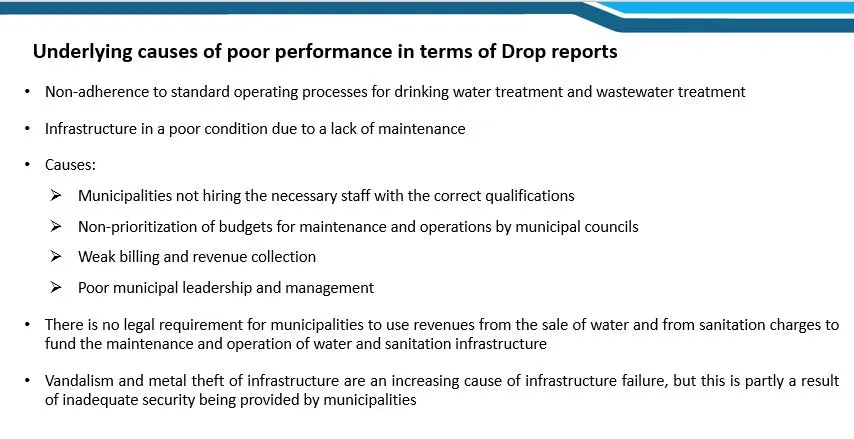 (Image: Supplied)
(Image: Supplied)
“Why is non-revenue water a problem?” he asked, somewhat rhetorically.
“A huge amount of money has to be spent to develop dams to capture and store water. This money is wasted if that water is thrown away through leaks.
“Municipalities buy treated water from water boards. If municipalities do not get revenue from that water, then they cannot pay the water boards. If water boards don’t get paid, they can’t treat water any more… If municipalities don’t collect the revenue they are supposed to collect, then they cannot afford to maintain and operate the infrastructure.
“South Africa is a water-scarce country and every drop counts. We cannot afford to throw treated water away through leaks,” Phillips said.
And yet, the No Drop report suggests that about 45% of municipalities still cannot provide basic information such as monthly consumption figures.
“In some cases, municipalities are unwilling to provide the information as it reflects badly on them…”
To address this, the new No Drop report recommends that: “DWS should consider strengthening regulations (not policy) whereby water services institutions are compelled to either measure and control or fix leaks on private properties, as government cannot continue to fund new infrastructure projects to supplement leakage.”
The department’s 2018 National Water and Sanitation Master Plan further states that: “South Africa is facing a water crisis caused by insufficient water infrastructure maintenance and investment, recurrent droughts driven by climatic variation, inequities in access to water and sanitation, environmental degradation and resource pollution, and a lack of skilled water engineers.
“This crisis is already having significant impacts on economic growth and the well-being of everyone in South Africa.
“However, despite all the support being provided to municipalities, the Drop reports indicate that water services continue to decline and that fundamental reform is required to arrest and turn around the decline in municipal water and sanitation services.”
Turning to the results of the 2023 Blue Drop drinking water quality findings, Mchunu’s department acknowledges that the South African Bureau of Standards states that it is not safe to drink water if less than 97% of tests for microbiological contaminants and chemical compliance conducted over a year comply with water quality standards.
“It was therefore not microbiologically safe to drink the water in almost half (46%) of our drinking water systems at times during 2022 when the Blue Drop audit was done, which resulted in increased risk of life-threatening water-borne diseases such as cholera and chronic diarrhoea.”
Of the 151 water service authorities and water boards assessed last year, it was found that 3% of the sampled systems were in a “critical infrastructural condition”; 12% in a poor infrastructural condition; 49% in an average infrastructural condition; 31% in good condition, and only 5% in an excellent condition.
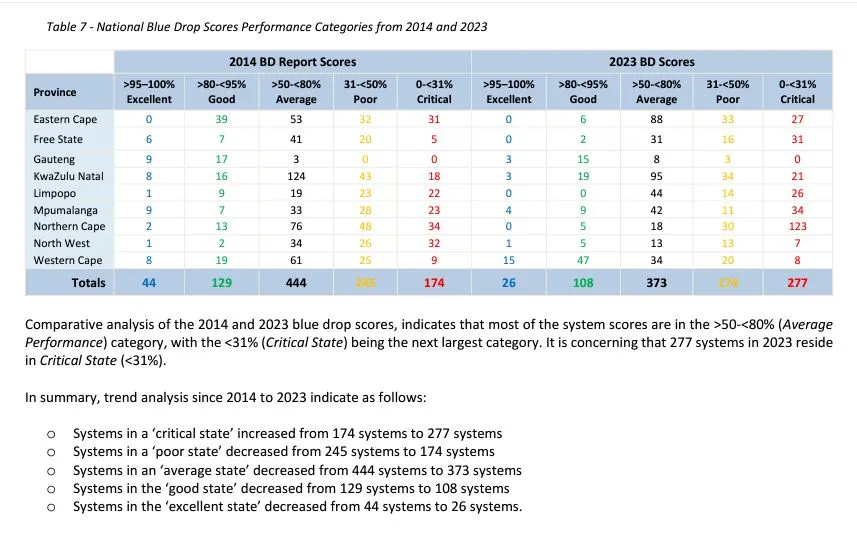 (Image: Supplied)
(Image: Supplied)
Overall, just 26 water providers managed to secure Blue Drop certificates this year, compared to nearly double that number almost a decade ago when Mokonyane pulled the plug on the national audit scheme.
At a provincial level, the Western Cape scooped 15 Blue Drop certificates – compared to just three certificates each for Gauteng and KwaZulu-Natal, with the Eastern Cape securing not one.
These certificates are only awarded to water providers that score above 95%.
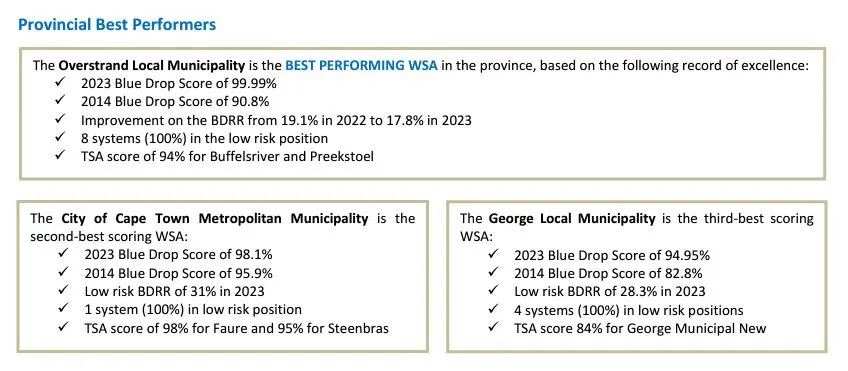 (Image: Supplied)
(Image: Supplied)
Two of the highest performers were the City of Cape Town (98%) and the Overstrand Local Municipality (99.99%).
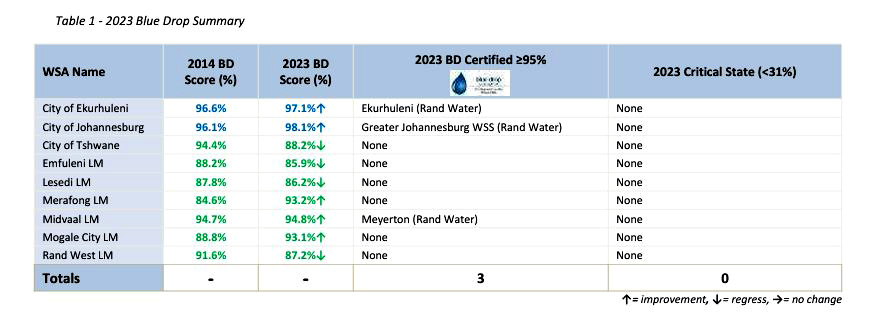 (Image: Supplied)
(Image: Supplied)
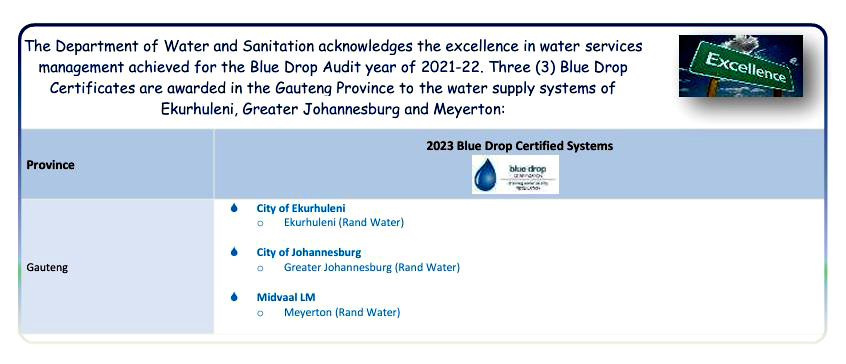 (Image: Supplied)
(Image: Supplied)
Johannesburg and Ekurhuleni (both supplied by Rand Water) scored 98% and 97%, while Tshwane (Pretoria) only managed a Blue Drop score of 88% (down from 94% in 2014).
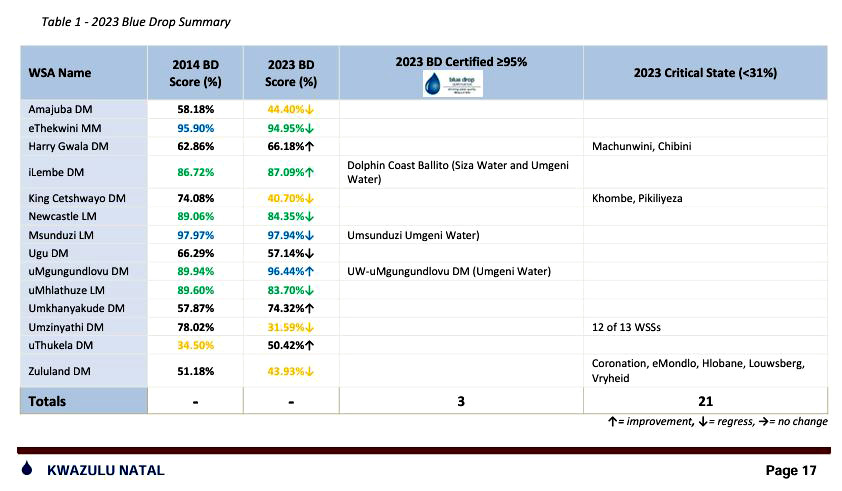 (Image: Supplied)
(Image: Supplied)
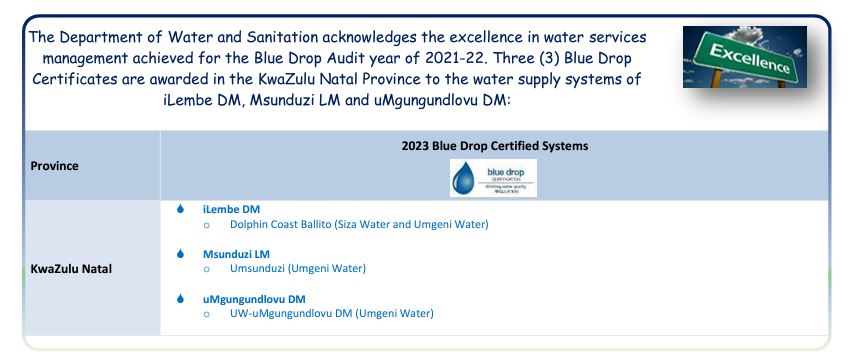 (Image: Supplied)
(Image: Supplied)
In KwaZulu-Natal, only three water authorities (all supplied by uMngeni-uThukela Water) were awarded certification – including Pietermaritzburg (98%).
The eThekwini municipality – which receives 98% of its treated tap water from uMngeni-uTzhukela Water – just missed out, with a score of 94.95%.
Not a single Blue Drop certificate was awarded to the Eastern Cape, with Gqeberha (Port Elizabeth) scoring 85% and East London (83%).
Overall, the national department said, there had been a “severe regression” in drinking water quality between 2014 and 2023, although “drinking water quality is generally good in the major metropolitan areas”.
“When the tests carried out by a municipality indicate that drinking water poses a health risk, the municipality is obliged by law to inform its consumers that the quality of the water that it is supplying poses a health risk.
“DWS has sent non-compliance letters to the municipalities with systems which scored poorly or badly in terms of drinking water quality in the 2023 Blue Drop report. These letters require the municipalities to inform their residents should they still have poor or bad compliance.
“The public can safely consume water from their taps if their municipalities indicate that the water being provided is being tested and meets the legal requirements – residents should check with their municipalities if this is the case.
“The department provides monthly water quality data received from municipalities on its Integrated Regulatory Information System webpage that can be accessed at ws.dws.gov.za/iris/mywater.aspx.”
All three of the national and provincial Drop reports can be accessed here. DM
https://www.youtube.com/watch?v=REeWvTRUpMk




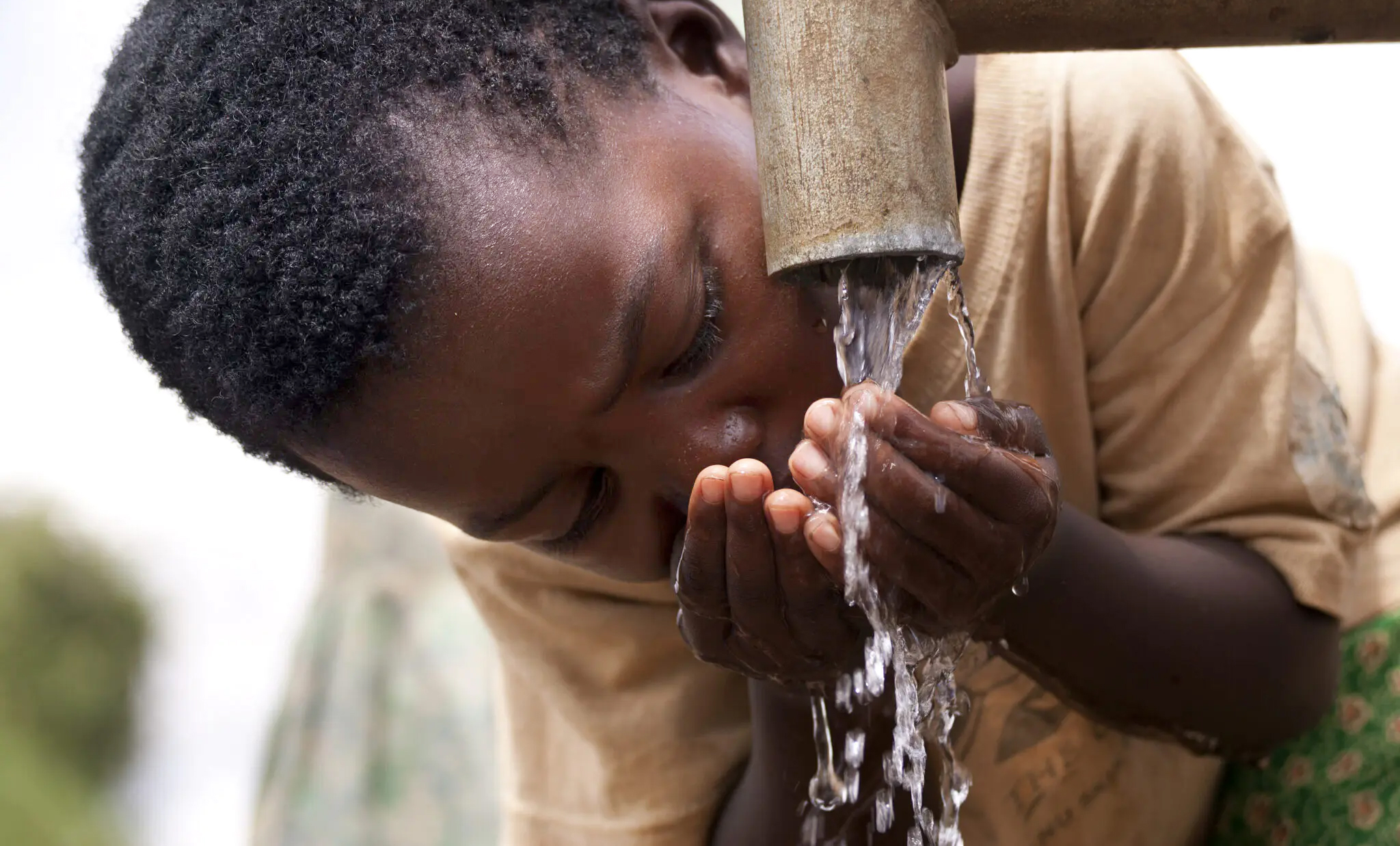 (Image: Supplied)
(Image: Supplied)